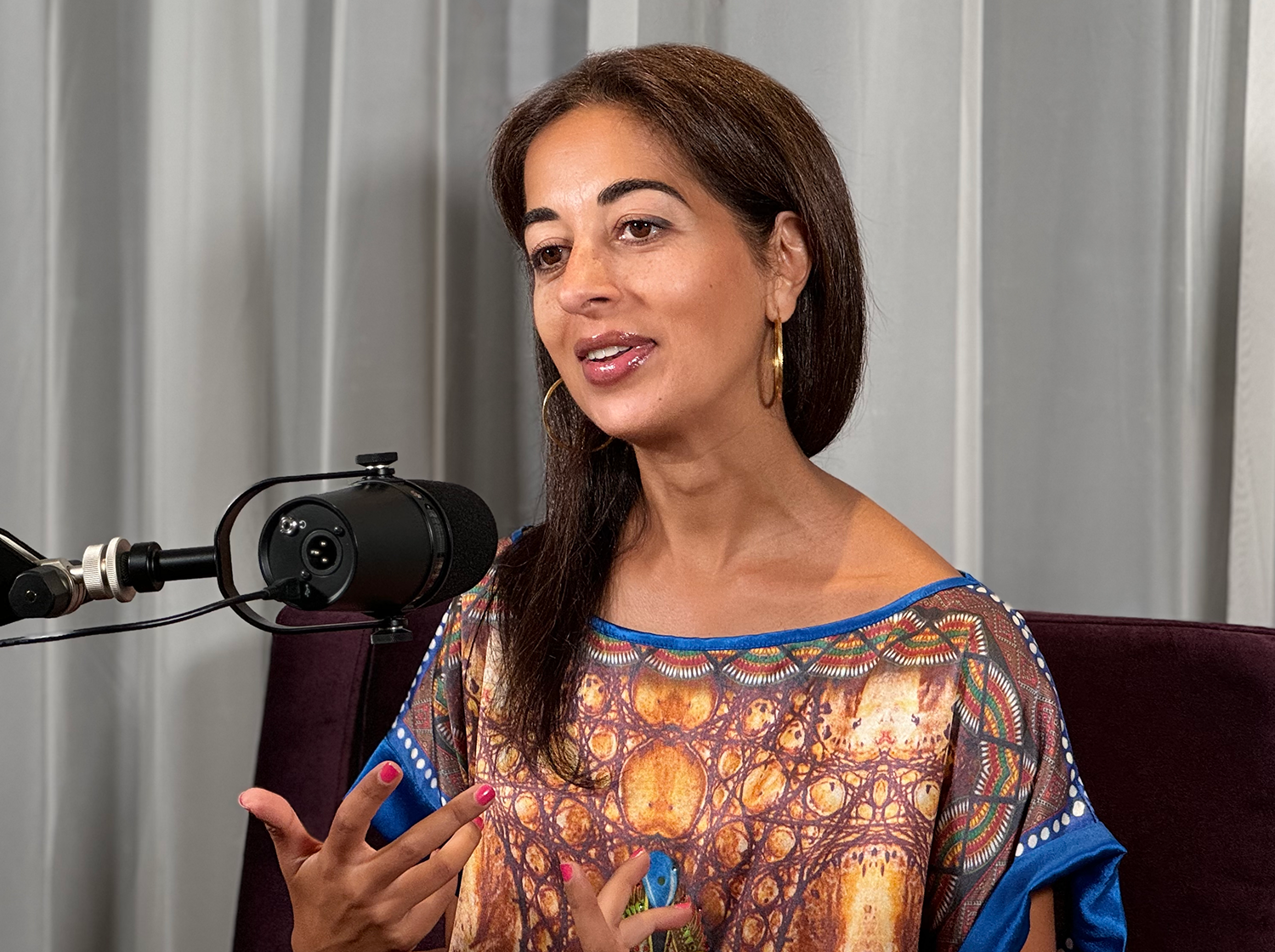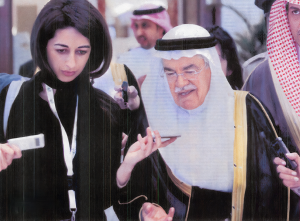December 18, 2023
What is the future of storytelling in video, podcasts, immersive articles, data visualization, social media and live events? How can data clarify and create new perspectives? Where are the new ideas and voices shaping tomorrow?
Bloomberg Media Studios started the New Creativity Speaker Series to connect with creators doing remarkable work across all mediums and to share new thinking and best practices from leaders in their fields. In this latest article, we learn how to turn creativity into a business from former Bloomberg journalist Ayesha Daya.

Ayesha records her “Muslim Footprints” podcast in Dubai. Credit: Courtesy of Ayesha Daya
By Michael Walker, Bloomberg Media Studios
Ayesha Daya can tell you that the dream of starting your own creative business is difficult, yet to her that’s what makes it so meaningful. It’s a lesson she’s learned during her midcareer pivot from business journalism to starting a communications and content creation business and eventually launching her own podcast.
“Something that I swear by is trusting in what’s difficult,” Ayesha says. “Every time I want to say no, I just feel the fear and do it anyway. And you do it, and it’s always the right decision.”
Ayesha began her career as a journalist covering oil, first in London at the Petroleum Economist magazine, and then in the Middle East for Dow Jones Newswires and Bloomberg News. Eventually, she felt the urge to do something new.
“I had been covering energy for seven years. Oil prices had reached a record during the boom of the early 2000s, they had gone down when the financial crisis hit, and they were starting to go up again, so energy was always a story,” she says. “I couldn’t think of a role that was going to be as fun, or a beat that was as high-profile. And equally, I felt like I had more stories that I ought to be telling.”

Ayesha interviews Ali bin Ibrahim Al-Naimi, the Saudi Arabian Minister of Petroleum and Mineral Resources, in 2011. Credit: Courtesy of Ayesha Daya
So she quit in November 2012, moved out of oil and journalism, and got work as a writer in different industries. She worked with one of the largest family-owned businesses in Saudi Arabia that had no online presence. She wrote annual reports. And she also got into scriptwriting.
“I did a couple of oil pieces for the New York Times, some culture stories for Bloomberg and the Financial Times – but I was gradually moving into new ways of telling stories,” she says.
Turning creativity into a business
She set up Kalima, which means “word” in Arabic. The business over the past decade has diversified from writing services into communications strategy, PR and events by leveraging a global network of quality partners and freelance expertise. Kalima produces videos, reports and, most recently, even mascots.
Ayesha believes one reason for her success is her particular way of working, which may differ from the typical consultant or vendor in that nothing is fully corporate – or at least it isn’t with her. Her work is not superficial, but deep, informed, accurate, and people react positively.
“I’m very hands-on,” she says. “I’m often in clients’ offices to fuse with the culture of the place and become part of the team. I spend time with them, understand them. That’s how I’m able to tell their story authentically.
“You scale that through the network. You scale through the medium. But each piece is very specific. It’s not manufactured. And that quality and specificity is what drives clients to us. Kalima is not a content factory, but more a content workshop. And that’s how I as a founder keep the passion and excitement going.”
Being your own boss lets you pursue your passions
Kalima is continuously challenged to tell stories in a variety of ways and formats. As a result, with every new client, the company’s storytelling skills and experiences it provides is enhanced. At the same time, Ayesha has the flexibility and freedom to be able to pursue passion projects.
One such project she’s developed and produced this year is “Muslim Footprints,” a podcast that deep-dives into Muslim civilizations through the ages. Each episode features an interview with an academic or expert.
“Muslim Footprints” has many goals, from making robust scholarship accessible outside academic circles to shifting perceptions about Islam by showing how diversely the Quran has been interpreted over the past 1400 years, showing how Islam has influenced, and been influenced by, so many different cultures over time, and making Muslims feel proud of their identity, and be interested in it. Ayesha says the podcast frequently makes it into top 10 charts, and she’s been inspired by the feedback she receives.
“Every few days I’ll get a message about it, from my journalist peers, from friends, from our parents’ generation, and, of course, from strangers on social media. Individuals are actively reaching out to tell me they’re listening as a family, or that they love the music, or that we’re responsible for their lifelong learning,” she says.
Three lessons from a creative entrepreneur
Ayesha has distilled three lessons from her creative journey that may resonate with anyone thinking of starting something of their own.
The first is to mine your network. All (bar one) of her clients have been people that know her or know her work.
The second is “feel the fear and do it anyway.” Never say no to work, she says, you’re running a business. You say yes, then figure out how to do it.
“Now there are two caveats to that,” she says. “Taking work that is below the value of your seat, or where the budget is insufficient. Where the budget is low, you won’t be able to deliver. When you take work that doesn’t reflect your value, you’ll also struggle to deliver because the type of project won’t be the quality you’re used to, and the people you’re interacting with are in a different headspace.”
And the third and most important lesson: Trust in what’s difficult. If you’ve identified a passion, more likely than not it’s going to take immense hard work to see it through. That’s the nature of creativity, she says.
“Creativity as a business is difficult,” Ayesha says. “It’s really difficult. Securing clients. Identifying the right people to help. Finding crews. Learning how to manage difficult clients. Constantly having to be an expert at something new and in new surroundings each time. Constant reinvention.
“But I’ve managed to do it, thanks to these lessons – they pop up as reminders on my phone every day,” she says. “So my final message is you can be creative and entrepreneurial and commercial. Don’t get lost in the creative and forget to pay the bills. But equally, don’t get lost in just paying the bills.”
Passion is the driving force behind creativity
Ayesha goes to her childhood to explain the roots of her passion – or what she describes as “the backstory to a lifetime of constantly asking questions.” Peeling back layers and getting to the heart of things not only drives her creativity, it is part of her DNA.
“I’m in Dubai, I’m running a communications business, I host a podcast about Islam. How did I get here?” she says. “My career as a journalist in the Middle East; the decision to start working for myself; and the projects I’m pursuing that are close to my heart, which include the podcast, make full sense once they’re understood as part of a larger personal trajectory.”
The passion for the Middle East comes from her father. Born in Tanzania while it was under British rule, he was inspired by Gamal Abdel Nasser, then president of Egypt, whose messages of nationalism and socialism and pan-Africanism were very inspiring for people across the developing world. When her father first arrived in England in the 1960s, he lived with a community of Arabs. He learned Arabic, and was fond of the culture.
“We didn’t watch much TV, but we watched the news,” Ayesha says. “My dad has this encyclopedic knowledge of history and politics, which means he can put things in context. So we’d have whatever was being shown on the BBC, and then my dad would tell us the backstory. So we grew up with this idea that there’s often a deeper story behind what you see or hear or read – and that knowing that story can completely change how you understand something, and then how you respond to it.
“And the Middle East was always in the news – it seemed to be this fascinating, complicated, misrepresented mess that touched everything. But equally, given the connections between the region and Islam, as a Muslim you felt like the Middle East’s story was your story, too.”
Meanwhile, her mother inspired her to explore what was unique about herself.
“One of the things she says is that God has given us all gifts and when we go back to him, we will be asked what we did with them,” Ayesha says. “So she’s instilled in us this idea of constant search to think about what our purpose might be, and then figure out how to fulfill it. So both parents, in different ways, taught us to always ask questions.”